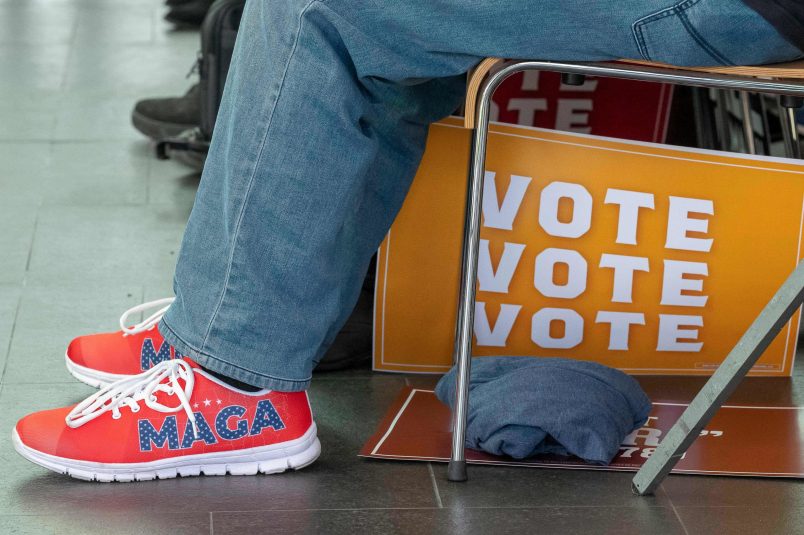A bipartisan group of election chiefs have signed their names to an increasingly popular takeaway from Tuesday’s midterms: election denialism — at least, as a political strategy — loses. That doesn’t mean it’ll go away.
On Monday afternoon, the nonprofit States United Action convened five secretaries of state to conduct a post-mortem on the midterms. The panel featured seasoned vets like Michigan’s Jocelyn Benson (D), Georgia’s Brad Raffensperger (R), and Kentucky’s former secretary of state Trey Grayson (R), as well as newly elected officials including Arizona’s Adrian Fontes (D) and Nevada’s Cisco Aguilar (D), both of whom defeated election deniers in their states last Tuesday.
The officials breathed a collective sigh of relief, considering three of them faced off with election deniers — Benson defeated Kristina Karamo (R), for example — during this year’s election season. In fact, election deniers running for secretary of state were defeated in every swing state, giving the new and old officials renewed hope for our democratic future.
“We can now say with certainty that this movement was rejected by the American people in this election,” Trey Grayson, the former secretary of state for Kentucky, said during the discussion. “This was a clear message that Americans believe in free and fair elections.”
So, does that mean that election denialism is dead? On this, the secretaries of state were less optimistic.
“We are really just at the halfway point of what is a multi-year, multifaceted effort to delegitimize democracy in our country,” said Benson. “We still have a presidential election now under two years away, in which we anticipate a lot of the same challenges that Brad [Raffensperger] and I encountered in 2020, regardless of what candidate is on or off the ballot.”
Benson and Raffensperger both famously drew ire from Trump when they rebuffed his pressure to overturn results showing that Biden had won their states during the 2020 election. At one point, Benson claims, Trump even said she should be arrested for treason and executed for refusing to cooperate.
“In key states, election-denying candidates who were running to be a governor or a top election official were defeated almost across-the-board—a major win for democracy and for the integrity of the next election,” Alex Tausanovitch, director of campaign finance and electoral reform for the Center for American Progress, told TPM. “At the same time, at least 125 election deniers were elected to statewide office or to Congress. So it is hard to predict the future of election denialism.”
This year, supporters of the Big Lie ran for office in dozens of states: A Washington Post tally found that 291 Republican candidates this year had stated that they believed the 2020 election was stolen or otherwise cast doubt on whether Joe Biden was legitimately elected. According to a later Post tally, more than half of them won.
Well-placed election deniers could throw the 2024 presidential election — not to mention every election to come — into chaos, potentially changing rules to benefit their party or triggering arbitrary legal battles that drag out for weeks. That’s why it was so notable that election deniers failed to win office in key, purple states — and the panelists noted that the ideology itself may now be losing its legs.
“What we saw in Michigan,” Benson noted, “was that election denialism is a losing strategy,” and if officials worked across party lines to reinforce faith in democracy, “that political strategy to delegitimize democracy will weaken, and continue to weaken in the years ahead.”



